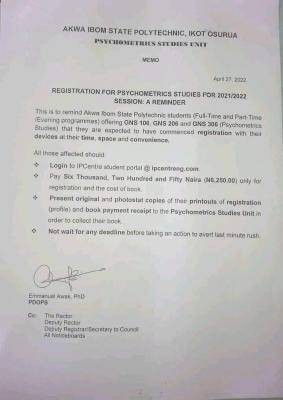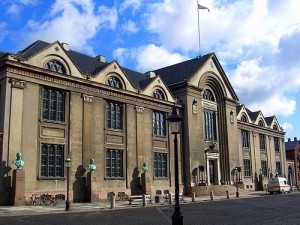
The Impact Of Cultism And Examination Malpractices On The Quality Of Education In The 21 St Century Nigeria by Abdulwahab Olanrewaju Issa D.L.SC., B.L.SC., M.L.SC. (ABU) senior lecturer and director, Centre For Continuing Education, Federal Polytechnic, Offa, Kwara State.
ABSTRACT
The paper provides a brief historical perspective to the issue of cultism in the Nigeria education system and the consequent emergence of examination malpractices.
The many destructive tendencies of cultism are also highlighted alongside the educational sub-sector; with particular reference to the tertiary institutions. The paper concludes that the twins menace of cultism and examination malpractices have had a huge impact in bringing about the present low quality of education in
Nigeria-a situation that spells doom for the future of the country.
Consequent upon the conclusion therefore, it advances a number of suggestions which could go a long way to stem the ugly tide of this unwholesome trend, which has adversely affected the good quality of our education
today.
INTRODUCTION
Many Nigerians were aware of the rot in the nation under the years of military dictatorship, but hardly knew the magnitude of the rot.
As it is with the nation, so it is with the education sector; only those saddled with the responsibility of administering our
education system can appreciate the crisis in the education system. And just as the damage done to the nation will take a long time to correct, sanitizing the education sector will take quite some years of continuous and determined reformation.
Many reform measures do not bear fruits overnight. This is even more so in the education sector. For example, the impact of Chief Obafemi Awolowo’s free primary education was not fully felt among the Yoruba till
the civil war and after, when they had to occupy Federal
positions abandoned by the Igbo.
The twin evils of campus cultism and examination
malpractices entrenched themselves in the campuses during the years of military despotism.
They are product of the years of decay while the nature of inter-campus linkages of cult groups as well as the sophistication with which malpractices are now being perpetuated in various examinations has made the matter more difficult to rout (Omabu, 2003).
Aims and Objectives of Education in Nigeria Education has been described as the best legacy that any nation or individual could leave behind for generation yet to come. It is an invaluable asset, therefore, to both
the individual and the society; since it has been also used from time immemorial, as a veritable instrument of cultural transmission.
Thus education, in one form or the other, had always been an integral part of the human society. Generally, forms of education could be broadly categorized into formal and informal. Whereas, the former takes place
in a formal or official setting, compartmentalized and certificated with designated learners and teachers, the latter is not so clearly designed.
It has a longer life-span commencing from birth and ending in the grave, with everyone around the learner
constituting his teacher even as no certificate is required.
Yet, this form of education is as important as the former; if not more; if only for the fact that it is quite a practical thing with all the evidences of effective and functional noble expectations and objectives of the formal system of education.
Indeed, it has a multilateral aim with the end objectives being to produce an individual who is honest, respectable skilled and cooperative and conforms to the social order of the day.
According to Fafunwa (1974), seven aspects of these educational objectives can be identified and these include:
1.To develop the child’s latent physical skills.
2.To develop character.
3.To inculcate respect for elders and those in position of authority.
4.To develop intellectual skills.
5.To acquire specific vocational training and to develop a healthy attitude towards honest labour.
6.To develop a sense of belonging and to participate actively in family and community affair.
7.To understand, appreciate and promote the cultural heritage of the community at large.
Thus, it was for good reasons that the Nigerian formal education system took after these objectives as enunciated in the National Policy on Education (1981).
According to Policy, the broad objectives of Nigerian education should emphasize such things as:
i.The inculcation of the right type of value attitudes for the survival of individual
society.
ii.The training of the mind in building valuable concepts, generalizations and understand of the world around.
iii.The acquisition of appropriate skills, abilities and competencies of both mental and physical nature as equipment for the individual to live in his society.
iv.The acquisition of relevant and balance knowledge of facts about local and world phenomena.
In the light of the first two objectives above, Nigerian education was to be geared towards self realization, better human relationship, self and national economic efficiency, citizenship, national consciousness, national unity, social and political progress, science and technological progress as well as national reconstruction.
In pursuance of the objectives therefore, our educational institutions (pre-to post-primary) have designed their programmes in such a way that functional individual who will be capable of contributing his quota to national development is produced. But the question however remains as to what extent have these objectives been achieved?
How well and indeed dependable are those measuring instruments such as internal and external examinations
capable of producing the desired results?
Evolutionary Trends in Cultist Activities in Nigerian Tertiary Institutions
The phenomenon of campus cults in Nigeria dated back to 1952, when Wole Soyinka winner of the 1986 Nobel Peace Prize for Literature-and a group of friends at the
University of Ibadan formed the Pyrates Confraternity with the motto “Against all Conventions”. The skull and cross bones were their insignia, cultivating a bohemian style that ridiculed the colonial attitudes mode of dress of the day.
This caught on among students and over the next two decades, the fraternity, a non-violent body, became established in all the tertiary institutions that emerged in post-independence Nigeria. The emergence of campus cults as they are known in Nigeria today began with a split in the
Pyrates Confraternity during the early 1970s when a breakaway group formed the Buccaneers Confraternity followed by the emergence of the Black Axe or the Neo
-Black Movement.
Inter-group rivalry then set in, even though skirmishes between them were limited
to fist fights. The 1980s saw the multiplication of cults in the more than 300 tertiary institutions across Nigeria as new groups such as the Eiye, Vikings, Amazons and Jezebel emerged, bringing with them more intensely violent rivalry.
By 1984, when Soyinka
initiated the abolition of the Pyrates Confraternity in all tertiary institutions, the phenomenon of violent had developed a life of its own. By the mid-1980s, reports had it that some of the cults have been co
-opted by elements in the intelligence and security
services serving the military government such that they were used as foils to the left-wingstudent unions which, along with university teachers, were among the only remaining bastions of opposition to military rule.
Cultism includes the activities of secret cults or societies that are very rampant in our institutions of learning today. The founding fathers of such societies do not have the mind of carrying out evils but as a pressure group that can monitor and defend
the interest of the immorality of students’ populace without violence. But the activities of the various
cults seen day in our institutions are far from the above reasons. They have constituted themselves into gangs of “never-do-well” set of people. Their
mission today is to loot, kill, steal and destroy lives and properties at will.
The violence associated with them is reported to be as a result of battles for supremacy among them. They have constituted themselves into a big cog in the wheel of Nigeria’s education development. Indeed, the growth and maturation of examination malpractice tendencies in our tertiary institutions have been considered as one of the direct fallouts of cultism.



